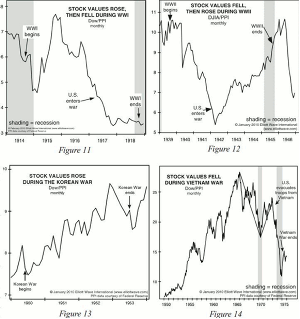As possible US military action against Syria dominated the news, and the stock market declined two days in a row, Bob Stokes of ElliottWave.com offers historical evidence on whether or not geopolitical events really affect the market.
On Aug. 26, US Secretary of State John Kerry said the evidence that the Syrian government under President Bashar al-Assad recently used chemical weapons on its people is “undeniable.” All over the media, Washington insiders speculate that the United States is gearing up to use military action against Syria. And British Prime Minister David Cameron has called for a special session of Parliament to discuss a possible military role for Great Britain in response to the Syrian government.
If military action is taken, what should investors expect from the stock market?
In the February 2010 Elliott Wave Theorist, Robert Prechter addressed the claims by some observers that war is bullish for stocks and by other observers that war is bearish for stocks. First the charts, then the commentary.
You can argue either side of an exogenous-cause case. Economists have in fact argued both sides of this one. Some have held that war stimulates the economy, because the government spends money furiously and induces companies to gear up for production of war materials. Makes sense. Others have argued that war hurts the economy because it diverts resources from productive enterprise, not to mention that it usually ends up destroying cities, factories, and capital goods. Hmm; that makes sense, too. Apparently the way that a war would change an economist’s stock-market outlook depends upon which version of the exogenous-cause argument he believes.
I will not take sides here. We can negate both cases just by looking at a few charts. Figure 11 shows a time of war when stock values rose, then fell; Figure 12 shows a time of war when they fell, then rose; Figure 13 shows a time when they rose throughout; and Figure 14 shows a time when they fell throughout. Who wins the war seems to mean little, either. A group of Allies won World War I as stock values reached 14-year lows; and nearly the same group of Allies won World War II as stock values neared 14-year highs. Given such conflicting relationships, why and how, exactly, does an economist expect war to affect his economic forecasts?
—The Elliott Wave Theorist, February 2010
Extensive research reveals that events outside the market, no matter how monumental, do not govern the market's main trend. What does? The collective psychology of investors governs the market's trend, and collective psychology unfolds in repetitive patterns or waves. You can see those repetitive patterns in stock market charts at all degrees of trend. Since market waves do repeat, they have predictive value.
By Bob Stokes of ElliottWave.com



















